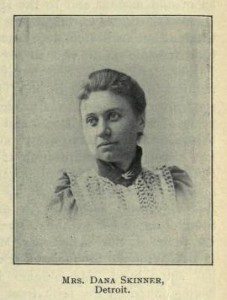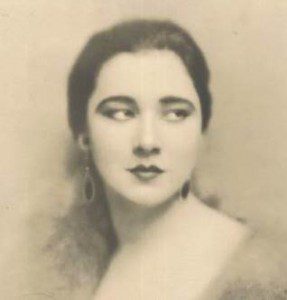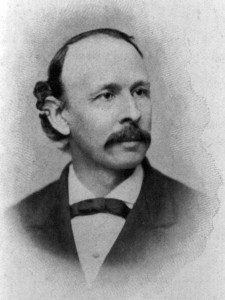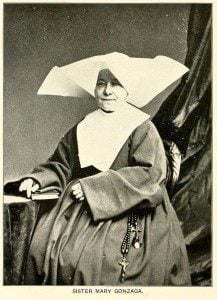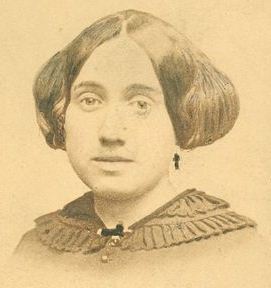 A GREAT SINGER DEAD. SISTER AGNES GUBERT, THE FAMOUS NUN, DIES IN BALTIMORE. (The New York Times, August 9, 1882). PITTSBURG, Penn., Aug. 8– Sister Agnes Gubert, probably the most noted teacher of vocal music connected with the Roman Catholic sisterhood in this country, and the possessor of a phenomenal voice, which would have made her one of the brightest lyric stars of modern times, died at St. Agnes Hospital, Baltimore, yesterday after a long illness. She had numerous family connections in this city, snd her pupils dwell in all parts of the country. Before taking the veil her name was Louise Gubert. Her mother, the oldest sister of the late W. Milnor Roberts, the civil engineer, who died last year in Brazil, married Mr. Gubert, a Frenchman, a Frenchman, and soon after that event joined the communion of her husband. Both the parents of Louise were gifted with fine voices, and years ago led a church choir in Philadelphia as soprano and tenor. Louise was the eldest and sole survivor of a family of 12 children. Sister Agnes was about 45 years of age at the time of her death. She was ten years old before her voice had attracted attention. She was given the best instruction, and at the age of 14 was placed under the charge of Parini, the great music teacher of Philadelphia. When her mother brought the little girl to the famous teacher, and after some exhibition practice, she asked him what his terms would be. He replied: “Madam, I have heard such a voice, such exquisite taste. I know not that I can teach her. Let the remuneration be the poor privilege that Parini can state that once Louise Hubert was his pupil.”
A GREAT SINGER DEAD. SISTER AGNES GUBERT, THE FAMOUS NUN, DIES IN BALTIMORE. (The New York Times, August 9, 1882). PITTSBURG, Penn., Aug. 8– Sister Agnes Gubert, probably the most noted teacher of vocal music connected with the Roman Catholic sisterhood in this country, and the possessor of a phenomenal voice, which would have made her one of the brightest lyric stars of modern times, died at St. Agnes Hospital, Baltimore, yesterday after a long illness. She had numerous family connections in this city, snd her pupils dwell in all parts of the country. Before taking the veil her name was Louise Gubert. Her mother, the oldest sister of the late W. Milnor Roberts, the civil engineer, who died last year in Brazil, married Mr. Gubert, a Frenchman, a Frenchman, and soon after that event joined the communion of her husband. Both the parents of Louise were gifted with fine voices, and years ago led a church choir in Philadelphia as soprano and tenor. Louise was the eldest and sole survivor of a family of 12 children. Sister Agnes was about 45 years of age at the time of her death. She was ten years old before her voice had attracted attention. She was given the best instruction, and at the age of 14 was placed under the charge of Parini, the great music teacher of Philadelphia. When her mother brought the little girl to the famous teacher, and after some exhibition practice, she asked him what his terms would be. He replied: “Madam, I have heard such a voice, such exquisite taste. I know not that I can teach her. Let the remuneration be the poor privilege that Parini can state that once Louise Hubert was his pupil.”
Louise displayed in early years a predilection for convent life. She had been educated partially at the Georgetown Convent, and openly among her friend declared her intention at sometime to take up her abode there. This intention very naturally met with the opposition of her mother, her father being dead, and she was even appealed to by the clergy not to leave her mother, when by the wonderful powers of her voice she might delight mutltitudes and thus confer a benefit upon humanity. But she was deaf to all entreaties. About the last time that she sang in public was the opening of the new cathedral in this city, having been specially invited to sing on that occasion. In Pittsburg her voice created as much of a furore among the musicians as it had in Philadelphia. Louise joiend the convent at Georgetown, but at a division of the sisterhood soon afterward she was transferred to Dechantal Seminary, in Wheeling. While at this seminary she was visited by many noted vocalists. Here it was the late Parepa Ross first heard Sister Louis sing, and frankly acknowledged that her voice was the sweetest she had ever heard. Liszt, the great pianist, recorded in his journal, published since his death, that at Wheeling he had heard the greatest cantatrice known to the world. Maz Strakosch heard of the sweet singer of Dechantal and visited her. Sister Louise sang for him, and so enthusiastic was the impresario that he offered her $50,000 for a season of six months in concert. Bishop Whalen declined to permit her to accept, and she remained at the school, where she devoted her talents to her always large classes. Her voice coudl nto be described as either that of a soprano or contralto, for she ranged with ease over the compass, making both extremes of these specialties. She was nerself more fond of simple ballads than anything else. Her voice was too sweet to be marred by machine music, and it was her habit while accompanying herself on the harp or the piano to strike the key note, and not until the last echo of her voice died away did her fingers again touch the chord. Sister Agnes was widely known in musical circles, and by her death the Sisterhood to which she belonged loses a self-sacrificing and valuable member.


